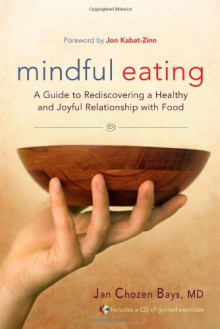 Jan Chozen Bays provides a solid primer for mindful eating. The seven types of hunger she outlines are a new way (or I guess forgotten way, she would argue) to approach eating, but for the most part not too radical. We're all familiar with the concepts of comfort food and emotional eating, and sayings like, "your eyes are bigger than your stomach." So while she reframed these different relationships to food, nothing (except maybe cellular hunger) seemed too far out there. I also appreciated the conditional behaviors she outlines and the various inner voices - critic, perfectionist, pusher - many deal with.
Jan Chozen Bays provides a solid primer for mindful eating. The seven types of hunger she outlines are a new way (or I guess forgotten way, she would argue) to approach eating, but for the most part not too radical. We're all familiar with the concepts of comfort food and emotional eating, and sayings like, "your eyes are bigger than your stomach." So while she reframed these different relationships to food, nothing (except maybe cellular hunger) seemed too far out there. I also appreciated the conditional behaviors she outlines and the various inner voices - critic, perfectionist, pusher - many deal with.That said, as many have pointed out, she makes some sweeping generalizations and doesn't include enough scientific data to win over my inner skeptic. Considering she's a physician, I would have expected more medical evidence and less "Would ya believe it?" style anecdotes. But, the book is written in a self-help style, so I suppose that's not warranted. And I'm also already totally on board with mindfulness and mindful eating so I was hoping for something more...technical, I guess.
My other issue is this: In the introduction she talks about binge eating, bulimia, and anorexia as destructive food relationships. What follows, however, largely leaves anorexia out of the discussion or treats it only as an after thought. Even the section on fasting, which is perhaps the best time to enter into that discussion, doesn't get into it. Instead, she focuses heavily on over eating and the need to curb those habits. While many of the methods and exercises she provides seem like they would help, since her focus is so lopsided it makes me wonder whether, in her eyes, over eating is somehow more of a disorder than under eating.
It's a shame for several reasons, not least of which is that I think mindfulness really could help those with anorexia as well. But the exercises she offers don't seem to deal with the particular anxieties and emotional distress specific to that disease.
We ordered this book as part of our growing collection of stress/anxiety/mental health resources that we have available to students in the library. I'll still recommend students give this a try, but it's disappointing knowing that many of them won't find what the book promises. It's impossible to know what a person is struggling with just by looking at them and they're unlikely to come right out and say, "yeah I personally need something that focuses on bulimia/BED/anorexia/etc." At the very least, however, it offers a starting point and some solid basic mindfulness methods.

 Log in with Facebook
Log in with Facebook 







